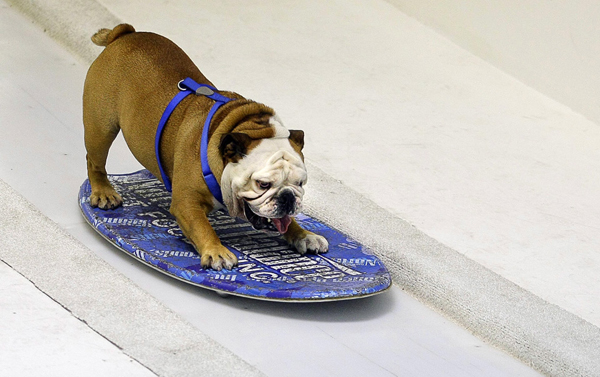If you were to ask what the quickest and easiest method was for teaching your dog a new trick, the answer would be - work with the nature of your dog, not against it. What we mean here is that you should look at what tricks your dog naturally does, or look for a dog trick 'in the making', like naturally putting a paw on your knee or rolling over etc.
If you choose a dog trick that naturally occurs, half your work is already done. Your dog will probably be eager to please as most dogs are and should therefore respond well to rewards. You can build on this to reinforce your dogs' natural ability rather than starting an entirely new dog trick.
Which Dog Trick Do You Choose?
Observe your dog and watch out for a potential dog trick. This may be something as simple as crawling along on its belly to, catching a Frisbee or a ball. As soon as your dog 'performs' one of it's natural tricks, associate it with a hand gesture or verbal command and then reward your dog with its favorite treat. It won't be long before your dog learns the procedure.
Eventually over time, you will be able to cut back on the rewards until your dog will perform the dog trick with just the hand gesture or verbal command such as 'fetch' or 'go get'. Now that the new trick is firmly lodged in your dogs' head, you will be able to build on it.
For example, if you have taught your dog to catch a Frisbee, how about increasing the distance that he will catch it from, or throw two Frisbee's one after the other. Get your dog to catch one, drop it and then run for the other!
Popular Dog Tricks
Some of the most popular dog tricks are 'sit' and 'come' etc. These are pretty simple to teach. To teach your dog to sit, with your dog standing firmly press on its hind quarters directly above it's back legs whilst at the same time saying the word 'Sit' quite assertively but NOT shouting. Most dogs will naturally sit. At this point, heap lots of praise on your dog and then give them a treat. After several repetitions of this, your dog will soon learn what 'Sit' means. Do not try this on older dogs that may have arthritis in their hind legs or hips.
If your dog does not sit when told, NEVER scold it. Just ignore it and try again another time. Otherwise your dog will associate 'Sit' with being scolded. If your dog persistently fails to sit, try another trick.
Each dog has different talents.
To teach your dog to come is simple. When your dog is at a distance, say loudly but not shouting 'Come here' or 'Come'. This will usually get your dogs' attention. Repeat the statement 'Come on', 'Come here'. Most untrained dogs at this point will probably look away and carry on with whatever it was doing.
At this point walk up to your dog but keep within around 5 feet away. Say 'Come here'. Your dog will probably now come to you. When he does, it's time for a lot of praise and a treat. Repeat this but increase the distance that your dog has to walk towards you more each time. Eventually, your dog will instinctively come to you whenever it hears you shout 'Come here', from any distance.
Again, if your dog fails to come to you, DO NOT scold it. I once got asked "Why won't my dog come to me?" On further investigation I found out that every time the dog ran away and then failed to come back, the owners would scold the dog when they got hold of it again. WRONG! The dog started to associate the command 'Come here' with a scolding. Totally the opposite. No wonder the dog failed to come to command.
Another dog trick you can try is 'Paw'. This involves saying 'Paw' then gently lifting the dogs paw with your hand followed by lots of praisetreats. After a while saying 'Paw' will cause your dog to raise its paw. You can extend this to two paws where your dog 'Sits pretty' on its haunches.
Another trick is 'Speak'. This usually works best with a naturally vocal dog. Every time your dog howls or makes a funny noise, praise the dog whilst saying the command ' Speak'. Eventually your dog will speak on command.
Teaching your dog a new dog trick should be a fun experience for both of you, and will give you lots of quality time together. Enjoy!
Article by Andrew Strachan. Find out more about dog behavior training and types of dogs at http://www.types-of-dogs.com
Article Source: http://EzineArticles.com/?expert=Andrew_Strachan
